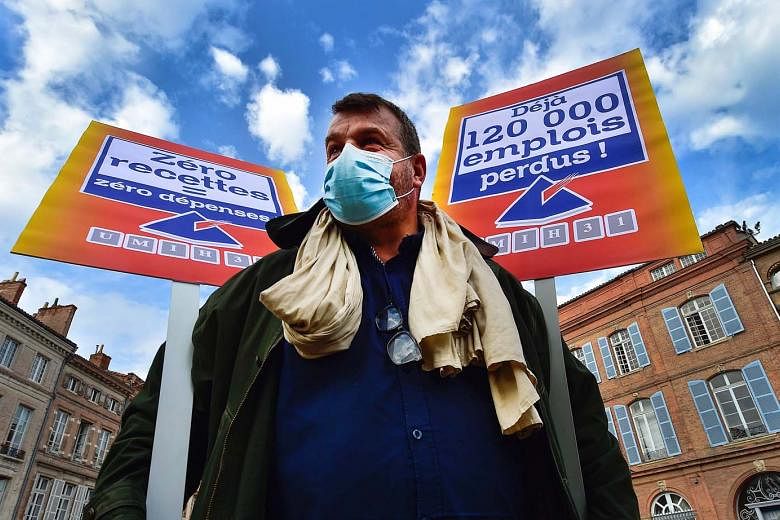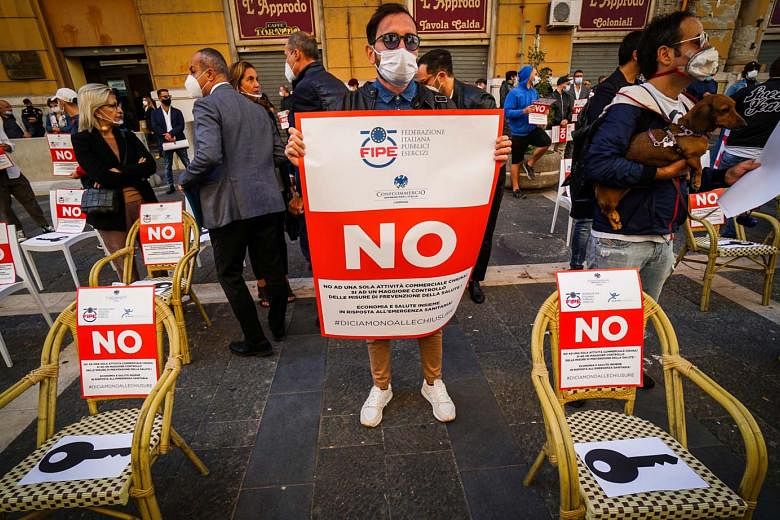LONDON • France has placed cities on maximum alert and yesterday ordered many to close all bars, gyms and sports centres. Italy and Poland have made masks compulsory in public. The Czech Republic has declared a state of emergency, and German officials fear new outbreaks could soon grow beyond the control of their vaunted testing and tracing.
Across Europe and beyond, Covid-19 has come roaring back and, as happened last spring, officials are invoking restrictions to try to suppress it. But this time is different.
Still reeling from the economic, emotional and physical toll of nationwide lockdowns that brought the continent to a virtual standstill, government officials are finding that the public might not be so compliant the second time around.
In some places, new restrictions are accepted, albeit grudgingly, because the alternative - new nationwide lockdowns - would only be worse. But there is widening scepticism that the public would even go along with such a drastic step.
Instead, as exhaustion and frustration with pandemic restrictions set in, governments are trying to thread a narrowing course between keeping the virus in check and what their publics and economies will tolerate.
That is especially so in democracies, where governments are ultimately answerable to the voters.
"It is going to be a lot more difficult this time," said Dr Cornelia Betsch, Heisenberg professor of health communication at Erfurt University in Germany, citing "pandemic fatigue".
As the crisis deepens, the once-solid consensus in many countries to join in sacrifices to combat the virus is showing signs of fracturing. New rules are challenged in courts. National and local leaders are sparring.
In Spain, the government on Friday decreed a state of emergency in the Madrid area. The step was taken over the heads of the highest regional court and objecting local politicians, and within hours, the nation's main opposition leader called on the prime minister to appear in Parliament to justify it.
Public scepticism is fuelled in many countries by the failure of governments to fulfil grand promises on measures like contact tracing.
In perhaps the most telling indication that people are either confused or done listening to guidance, the number of cases continues to explode, including in places where new measures have already been promulgated.
-
What are some of the measures
-
GERMANY
Under new rules enforced yesterday, bars and restaurants will close at 11pm in Berlin until Oct 31 in a partial curfew, a measure already imposed - but starting an hour earlier - in the financial capital Frankfurt.
The shutdown in the German capital - which has more than 400 new cases daily - also covers all shops except pharmacies and petrol stations, although they will be banned from selling alcohol.
SPAIN
The government declared a state of emergency and a new partial lockdown for Madrid on Friday, as it faced increasing public resistance to anti-virus measures.
People were barred from leaving the city except for work, school or medical reasons, measures denounced by the city's right-wing authorities.
Restaurants in Madrid were ordered to stop serving after 10pm, and to close by 11pm - when many people are just considering sitting down to eat.
FRANCE
The French government last month shut bars and restaurants in the southern port city of Marseille, provoking the fury of local officials.
Partial shutdowns have since been extended to Paris and other major urban areas, and another four French cities were placed on maximum coronavirus alert on Thursday, with bars ordered closed and public gatherings limited.
BRITAIN
Prime Minister Boris Johnson is expected to outline tomorrow a new three-tier lockdown regime.
Communities Secretary Robert Jenrick said on BBC Radio that the new approach would offer "simple national rules" to tighten restrictions where needed, "but then also greater freedom for those local areas to design further measures" in partnership with Whitehall.
Several urban centres in northern England have been hit with a range of curbs on social life such as a ban on different households mixing.
Liverpool City Region mayor Steve Rotheram said the government had informed him that his conurbation of 1.5 million people was set to enter tier-three lockdown from Wednesday.
The highest tier three level of lockdown for England is expected to go beyond existing restrictions such as a curfew for pubs, and close hospitality venues altogether, similar to measures enacted in recent days elsewhere in Europe. No social contact would be allowed outside a person's own household, including outdoors.
AGENCE FRANCE-PRESSE, NYTIMES
Portugal ordered new restrictions last month, but yesterday recorded 1,646 new cases, the highest daily figure since the start of the pandemic.
In northern England, where new rules have come and gone and come again, the most tangible result has been the sowing of confusion, not slowing the contagion.
Officials are now warning that hospitals could face a greater flood of patients than at the height of the pandemic in April.
The World Health Organisation on Thursday announced a record one-day increase in global coronavirus cases. Europe, as a region, was reporting more cases than India, Brazil or the United States.
In Brussels, European Union commissioner Mariya Gabriel said yesterday she had tested positive for the virus, making her the first top Brussels official known to have been infected.
The pitfall of imposing stricter new measures has already been witnessed in Israel, the only country to order a second nationwide lockdown. It has led to chaos and rampant protests.
"People view the decisions as political and not health-based," said Mr Ishay Hadas, a protest organiser in Israel.
While issues around mask wearing and other prudent measures remain far less politicised in Europe, especially compared with America, the prospect of a winter under tight restrictions or even lockdowns is stirring new frustration and dividing political parties.
With Britain expected tomorrow to announce even more sweeping measures - many of them focused on curbs on drinking and carousing - the leader of the opposition Labour Party, Mr Keir Starmer, has challenged the government to produce any scientific evidence showing that early pub closings help slow transmission.
"People are very confused," said Professor Robert West, a health psychology expert at University College London. "I couldn't put my hand on my heart and say I know what the rules are."
NYTIMES, AGENCE FRANCE-PRESSE


